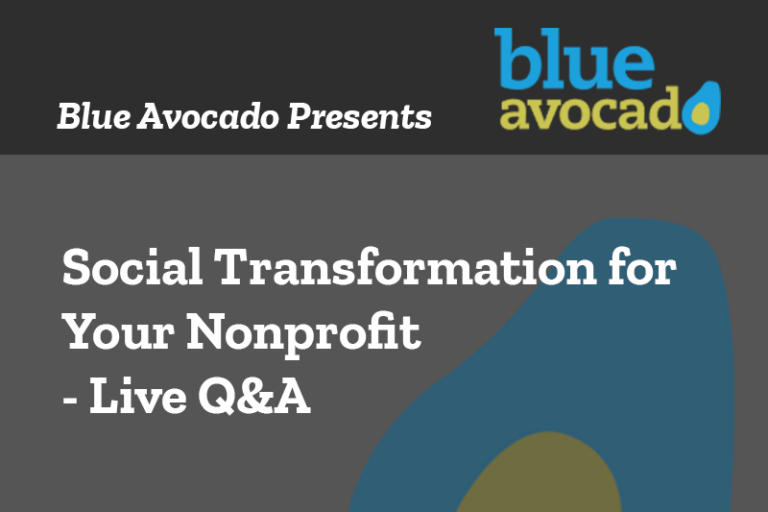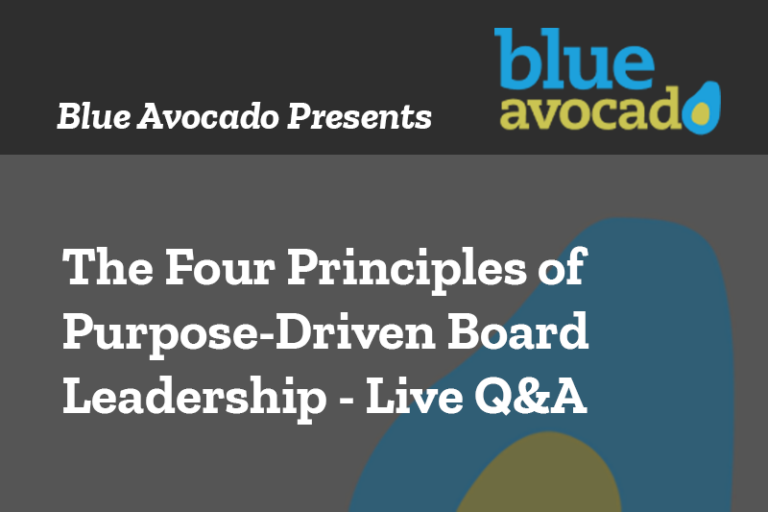Recent Posts
Navigating the nonprofit world can be challenging. Blue Avocado offers expert guidance on a range of topics — from building strong boards to maximizing your fundraising impact. Explore our latest posts for practical tips, strategies, and solutions to common issues facing nonprofit organizations today.
-
Boards of All-Volunteer Organizations
-
Three-Step Immigration (IRCA) Compliance for Employers
-
Obama: the Nonprofit Sector’s Favorite Son?
-
Overtime Pay for Nonprofit Preschool Teacher?
-
The Best Way to Raise Money? Choose a Revenue Strategy
-
What Should Nonprofit Boards Know About Insurance Brokers?
-
In Search of Unicorns: Finding & Hiring Outside Grantwriters Part 2
-
Unicorns Found: Meet Two Grantwriters
-
Word on the Street from the Council on Foundations Conference
-
The Unrecognized Value of Community Nonprofits, Hiring Grantwriters, Extended Warranties, MTV
-
In Search of Unicorns: Finding & Hiring Grantwriters, Part 1
-
Nonprofit Budgets Have to Balance: False!
-
Don’t Drive, Chew Gum and Use the Phone at the Same Time
-
Meaningful Acts of Appreciation for Nonprofit Boards and Staff
-
Nonprofits and the Media
-
Pay Off My Student Loan or Pay Into a 401K?
-
What Should We Do About an Employee’s Outrageous Blog?
-
Why is it called Blue Avocado?
-
Abolish Board Committees?
-
Reasons to Have (& Not to Have) an Attorney on a Nonprofit Board
-
Can We Require An Employee To Take Her Meds?
-
Promises, Promises: Rural Advocates vs. Big Philanthropy
-
Five Ways to Let Government Money Run You Over
-
Good Management vs. Good Leadership
-
What Do I Say to a Donor or Funder?
When we embark upon what’s known in the nonprofit world as “donation season,” chances are that your organization thinks about putting together a fundraising video or other media that demonstrates the impact of your work.
How to evaluate an employee’s request for a religious accommodation and when to appropriately provide such accommodations.
Every nonprofit needs a budget, but some are more effective than others. Consider these tips for making a budget that works well for everyone.
Forecasting is financial prototyping, and it’s a tool that will remain as part of our finance strategy. Download the budget forecast template.
How can supervisors help their employees perform at their most productive level and maintain consistency in their approach to managing their employees?
Seven results-based ideas and three relationship-based ideas on how to build your nonprofit’s capital structure.
Terminating an employee because they haven’t shown up or reported in should be pursued only after proactive efforts to reach out have failed.
Blue Avocado explores procedures concerning who is permitted to catalog and inventory donated items received by a nonprofit.
Tax law concerning nonprofit organizations can be complex. Blue Avocado explores where tax laws do and don’t apply.
No one is too important, too indispensable, or too essential to escape discipline for zero-tolerance policy violations.
ByDr. Kimberley Richards, Rev. David Billings and Ronald Chisom
November 1, 2021
Community and Culture,Webinars
Mr. Ronald Chisom, Rev. David Billings, and Ms. Barbara Majors of PISAB facilitated an interactive webinar to introduce concepts that address the root causes of systemic oppression.
Learn how Compassionate Atlanta developed trust with one another through shared power in their nonprofit model.
Jim Taylor of BoardSource shares an overview and description of “The Four Principles of Purpose-Driven Board Leadership” – a new board leadership mindset based on four fundamental principles.
An employee has taken proprietary information and used it to start a competing nonprofit. What is our recourse, if any?
Solving challenges is ultimately about creating the outcomes we want. By asking goal-oriented questions, you’ll come up with better outcomes.
Implementing a finance committee of the board of directors was one of the best things our organization ever did. Here’s why.
Four reasons your nonprofit and its mission can benefit from conducting a board evaluation.
It is important to work with that employee to understand the basis for the request and to determine whether it is appropriate.
When web designers have an email from another nonprofit saying they don’t mind if you use one of their images, are you ok to use the image?
Internal controls are more important than ever to have in place and operating effectively in order to prevent wrongdoing and malfeasance.
A free, fill-in-the-blanks template for those wishing to found a nonprofit, from someone who founded a nonprofit while stranded in Malta.
It’s important to be open and honest in communications with funders. Nonprofits should articulate why the metrics may have changed.
Approaching investigations in a way that the process is fair, objective, and thorough, as the law requires, can be formidable for a beginner.
Saying “I have an idea” can cause issues because of the implied ownership. It’s important for us to offer ideas in the right way.


























